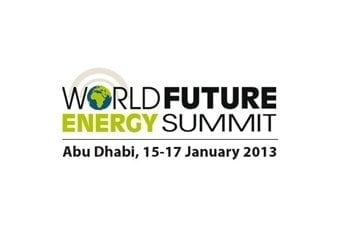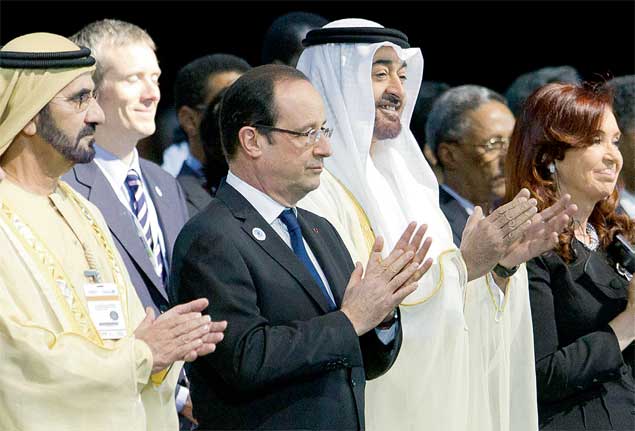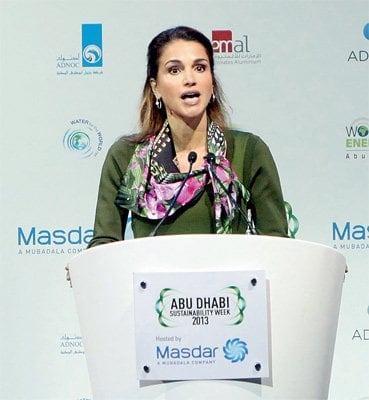Mehmood Ul Hassan Khan
UAE and WFES 2013
United Arab Emirates, being the leader of renewable energies and technologies in the region and one of the active exporters of renewables around the globe once again successfully staged the 6th edition of the World Future Energy Summit (WFES) 2013 in Abu Dhabi January 15-17. It was inaugurated by General Shaikh Mohammed bin Zayed Al Nahyan, Crown Prince of Abu Dhabi and Deputy Supreme Commander of the UAE Armed Forces. The grand opening ceremony was attended by a distinguished and talented audience of politicians, business leaders, innovators, scientists, engineers and entrepreneurs. More than 30,000 people from 150 countries including world leaders, government ministers and high official and important delegations gathered at Abu Dhabi’s National Exhibition Centre.
Salient Features
The 6th WFES was the world’s foremost annual gathering to enhance advancement of future energies resources mix. It was first initiated in 2008, Abu Dhabi. During which many effective policy measures were announced to achieve energy efficiency and clean technologies through the involvement of political, economic, business, and academic leaders in the region and around the globe. It was hoped during the said summit was the transition to clean energy would be hastened in the near future with the rise in oil prices.
Inauguration Speech
In his inaugural speech General Shaikh Mohammed bin Zayed Al Nahyan said the UAE despite being a leading fossil fuel producer, is committed to global energy security with investments in clean and renewable sources. “The UAE always called and calls for concerted efforts and constructive cooperation with the international community at all levels, both with governments, organisations or companies or individuals and innovators in an effort to reach the desired solutions for energy security,” he added. French President Francois Hollande called for more investments in renewable energy projects to prepare for the post-oil era and to avoid global warming. “If we don’t spend … we will have a catastrophe,” Hollande warned the summit.
Diversified High-powered Participation
The World Future Energy Summit (WFES) 2013 brought together global leaders in policy, technology, climate change, business and sustainability solutions to discuss the state of the art, develop new ways of thinking and shape the future of renewable energy. Different substantial agreements were finalized during the WEFS 2013.
His Majesty King Juan Carlos of Spain, the President of Iceland Olafur Ragnar Grimsson, Prime Minister of Serbia Ivica Dacic, Prime Minister of Montenegro Milo Djukanovic, and President of Mauritania Mohammad Ould Abdul Aziz were also attended the WFES 2013. Furthermore, Queen Rania Al Abdullah of Jordan and French President Francois Hollande were the key speakers. Queen Rania Al Abdullah of Jordan said Abu Dhabi’s bold vision for sustainable energy was transforming this nation and inspiring our region at a time when the Arab world is at a critical juncture. “Fuelling our future with innovation and humanity, bringing power, and with it, empowerment, to millions around the world, so, thank you Shaikh Mohammed bin Zayed Al Nahyan and Abu Dhabi, and Masdar for bringing us together she added”.
Showcasing of different Mega Projects
According to WFES 2013 more than Dh29.44 billion ($8 billion) of international clean-tech and renewable energy projects were showcased at the Project and Finance Village and a record visitors paid personal visit to watch the latest renewables and technologies available in the international markets. It also rigorously focused the nexus of energy and the challenges in some counties. More than 40 new projects of renewables mix were exhibited during the WFES 2013. It was unique; it witnessed the launch of a number of new projects alongside regular ones. Besides, there was the international exhibition, the Project and Finance Village, the Young Future Energy Leaders programme, corporate meetings and social events.
WFES 2013 Initiatives
The WFES 2013 initiated the Sustainable Living Area, incorporating the WFES Eco-Home endorsed by Estidama green building initiative of Abu Dhabi. As well as for the first time, there was a Green Jobs Fair. There will be massive employment opportunities in this field in the future, which should be a motivation for Arab countries.
Renewables Multiplier Effects
WFES 2013 has diversified socio-economic multiplier for the UAE, region and the world too. It has special importance for the regional countries including GCC because renewable energy can diversify energy sources. The implementations of WFES 2013 protocols would help the regional countries to achieve easy and smooth supply of energy resources. It would also transform traditional economies into green economies, which is the main tool for achieving sustainable development.
According to world energy (2012), every one megawatt of solar energy, 15 jobs will be created across the value chain. It increases business opportunities. It fastens national economy. It provided real income generation opportunities. It reduces negative environmental impact. It gradually achieves sustainable economic growth. It secures sustainable development. It protects life and acts like a life-line to humanity. It achieves socio-economic prosperity. It provides comparative advantage. It attracts inflows of huge FDIs. It supports the national economy and saves lots of foreign exchange.
UAE Leading/Supportive Role
The WFES 2013 has already highlighted the seriousness of the UAE towards renewable energy. UAE is doing great to fight against climate change at regional and international level which shows its concrete political will and economic preparedness towards green energy mix. It was strongly suggested that price-based subsidization, incentives and financial mechanisms that support renewable energy necessary to overcome the obstacles and to embrace the potential. It was further decided to start continuous awareness campaigns to target various consumers, companies, households both urban and rural to encourage them to make the move to renewable energy.
Ideal Platform
It provided ideal platform to innovators and investors, businessmen and bureaucracy, technology practitioners and people to pool ideas, minds and finances to move forward to achieve sustainable future based on renewables and green/clean-tech solutions.
UN Secretary General
Addressing the WFES 2012, Ban Ki-moon, UN Secretary General said that over a billion people lacked access to electric power and three billion people depended on coal, wood and waste substances for their heating and cooking purposes. The advancement in renewables and clean-tech solutions would be answer to these human miseries and economic problems, he added.
The International Energy Agency’s World Energy Outlook (2012) said that around half of the 1.3 billion energy-poor populations live in Africa. Additionally, there are 2.7 billion people living without clean cooking facilities; more than 25 per cent of these people reside in Africa. It also highlighted.
Significance of Renewables
The emerging socio-economic problems, geo-political hurdles and geo-strategic compulsions stress the revision of existing development goals, agenda and fight against climate change because they proved unstable and unsustainable. Therefore, renewable energy can be a key part of the solution to many of these challenges and problems and WFES 2013 provided clear-cut path to all the countries to remove all barriers in this regard.
Prospects of Solar Power
During the WFES 2013, it was discussed that the GCC and MENA can developed solar power easily. It is indeed a very healthy sign. All applications of solar power, especially the two common methods, Concentrated Solar Power (CSP) and Thin Film PV Cells, are feasible and applicable in the Arab world. CSP requires large-scale plants in the desert and the Thin Film PV Cells can play an important role in generating electricity in buildings as well as in remote rural communities, which are not connected to the grid, and thus help in achieving self-sufficiency. GCC and all the regional countries have comparative advantage in terms of cheap labour, fiscal surplus, easy and smooth supply of clean-tech solutions of the Masdar and above all strong political will. Its costs are falling, demand is growing, and technology is developing very fast.
Energy Diversification
Energy diversification protects the long awaited dreams of socio-economic prosperity. It promotes stability and sustainability. It provides essential inputs of industrial productivity, generation of employment, reduction of poverty and above all promotes qualitative life and renewable/alternative energy is a value-addition.
UAE government in its integrated the Abu Dhabi 2030 Plan and the Dubai Integrated 2030 Strategy has already suggested policies/programs and plans for achieving energy diversification targets in the days to come. Both strategic plans promote solar, wind, and waste-to-energy projects throughout the country. Under the Abu Dhabi 2030 Plan, the capital will be powered by clean technologies and alternative sources of energy, with an initial target of achieving 7 per cent renewable energy generation capacity by 2020. Concurrently, the Dubai Integrated 2030 Strategy targets a 30 per cent reduction in power demand and total energy consumption by 2030. Moreover, 99 per cent of Dubai energy production uses gas and one per cent using diesel, the energy strategy 2030 will reduce its dependence on oil and gas. Twelve per cent of its future energy could come from nuclear energy and another 12 per cent will come from coal-fired power plants, 71 per cent will come from gas and 5 per cent from renewable energy. Moreover, according to International Energy Agency (2011), the UAE will increase its renewable energy up to 7 percent by the year 2020.
Concluding Remarks
The World Energy Forum Summit 2013 provided an ideal platform to policy makers, economists, political leaders, businessmen and investors to share expertise, knowledge, and finances to move forwards from brown economies to green economies. Green stands for prosperity, security and sustainability. Renewable energy mix and clean-tech solutions hold the key of future socio-economic development. It would reduce the chances of any regional or international power play on the issue of energy security. On the long run it would get free the international economy and financial system from the clutches of oil and gas exploitation.
UAE is the hub of latest renewables and clean-tech solutions in the GCC and MENA. It has become regional leader in exporting its potential of renewables to the world. Masdar stands for its green energies custodian. Reservoirs of conventional sources of energy are depleting. So it is the need of the hour to use renewables for the safety of humanity, planet and socio-economic fabrics and the UAE is doing great in this respect.


